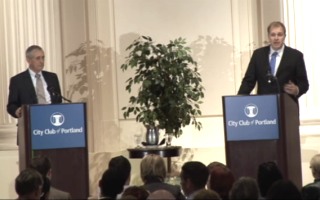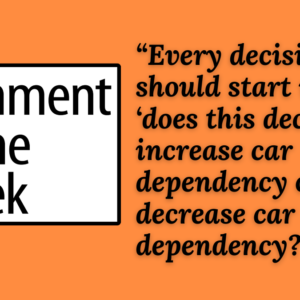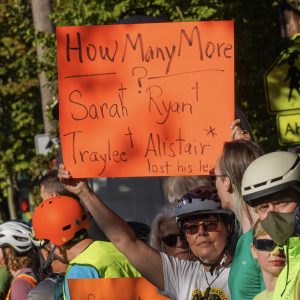
(Image: Screen grab from live stream)
Mayoral candidates Jefferson Smith and Charlie Hales shared their visions at a City Club debate at the Governor Hotel in Portland today. The debate was moderated by Tracy Barry of KGW-TV. Transportation came up several times during the debate, and one of Barry’s questions asked specifically about our bicycling goals.
Here’s the question she posed:
The current City Council has committed Portland to pursuing policies that will lead to 25% of all the trips within the city to be made by bicycles and 25% by public transportation by 2030. Is this a realistic goal? And what will you do in the next four years to advance it; especially in light of tight budgets that have curtailed mass transit and may actually pit bicyclists against motorists in the quest for infrastructure improvements?
Here’s how Smith answered:
“I hope it’s realistic. If we’re going to grow at 5,000 to 6,000 people a year, we just don’t have room for 5,000 to 6,000 cars a year, so we’ve got to figure out ways for people to move around the city that include cars, but aren’t limited to it.
I also… hope we won’t frame the debate as we have too often as bicycles vs. cars. The way I look at the future tea leaves, I see an aging community, I see retirees. We have more baby-boomers retiring that are not using primarily even cars or bikes. We need an age-friendly transportation system that works whether you’re 8 or 80.
Some ways we can do that: First, we need to plan our city for fewer* short trips (*pretty sure he misspoke and meant more short trips); second, we need look at a broad-based transportation [funding] package; third, we’ve got to be cost-conscious with streetcars, CRC’s [Columbia River Crossing project], etc..”
And here’s Hales’ response:
“Of course it’s not realistic. It’s ambitious, and it’s wonderful. And that’s why we are Portland and we are that national model.
When I left office there were 4,000 bike commuters a day coming to downtown Portland, now there are 16,000. That’s not realistic, so we need to keep being unrealistic in that way.
Now, we need to be good stewards of the transportation system that we have and put more money into basic maintenance, pave the streets, and show people that we are managing their money well, and that we’re not spending it all on bike lanes; but we need to keep building that city of the future even when we pave the cracks in the city that we have.”
Both of the candidates’ answers riffed off themes they’ve repeated throughout their campaigns. Unfortunately, neither candidate really addressed the question of how they’d advance the bicycling goal. I look forward to asking them myself, but I would have loved for them to share that with the broader audience that was watching this debate.
I think it’s also worth noting, that given all the issue the moderator could have asked about, she felt the Bike Plan for 2030 and how we’ll achieve our bicycling goals was worthy of time. That’s a good sign.
You can listen to full audio of the debate at PDXCityClub.org.







Thanks for reading.
BikePortland has served this community with independent community journalism since 2005. We rely on subscriptions from readers like you to survive. Your financial support is vital in keeping this valuable resource alive and well.
Please subscribe today to strengthen and expand our work.
I like that question. A cut above what sometimes passes for news in some venues.
Both answering carefully. Charlie predictably sneaks the p-word in. But, yeah, mostly sound bites.
…on the fewer answer, maybe he meant fewer short trips by car?
Yeah, that’s my guess. When I was covering non-City-of-Portland transportation planners, a “trip” was shorthand for an “auto trip.” Bikes, transit, etc., were treated not as different kinds of trips but as nonexistent ones, because the whole point of transportation planning in most places is when to add road capacity, and they added negligible demands on road capacity.
I’m not so sure about that. I’m thinking the emphasis on short trips is part of the 20-minute neighborhood concept, which promotes walking and biking over driving. As mentioned in Bike Walk Vote’s questionnaire:
http://bikewalkvote.org/candidates/mayor/jefferson-smith.html
And he’s got five other bullet points to his answer, worth checking out. But basically I would see the emphasis on shorter trips being a means of encouraging trips via active transportation.
Not sure what the “fewer” is doing in there though :). Maybe he meant fewer *and* shorter trips, with the “fewer” coming about via people working from home? Which is a valid enough answer. Or like Jonathan suggests, he might have just meant to say, “more.”
(Note to politicians: if you want to get people talking about your policies, phrase them in confusing wording so people have to talk about them more!)
I see your point that they weren’t specific, but I like the way Smith not only refused the “cars vs. bikes” bait, he specifically rejected it. I feel like he truly gets it when it comes to transportation, and he is able to articulate it in a way that isn’t anti-bike or anti-car. Impressive.
A good sign, yes, even though the question tries really hard to plant the bikes vs. cars meme!
Hales’ response reminds me of the Forest Park MTB access debate. ‘Sure, talking about progressive ideas is what makes us Portland. Not moving forward with all of our talk is what makes us Portland lawmakers.’ Sounds to me like Hales’ is setting the stage to dismiss a necessary shift in transportation policy in Portland as Pie in the Sky.
“…and show people that we are managing their money well, and that we’re not spending it all on bike lanes”. Interesting choice of wording from the candidate who blasted that misleading Oregonian/Slovic article on his website for months. How about just telling people the truth, that “bike lanes” are a tiny percentage of the transportation budget?
The fact that these two guys are our candidates is really a poor reflection of our city (or maybe it’s an accurate reflection of the sad state of our city?) and I’m not voting for either one of them.
If Oregon is “ungovernable” (Kitzhaber, 2003) perhaps Portland is unmayorable.
Agreed. They both seem to not represent our city very well.
“…telling people the truth, that ‘bike lanes’ are a tiny percentage of the transportation budget?”
The problem here (IMO) is that much of the tiny percentage spent on “bike lanes” or other non-auto infrastructure is spent on previously non-existent, i.e. “new” infrastructure–even if it is just re-striping a street to “add” a bike lane. Going from nothing to something is always going to stand out in people’s minds as a big thing, regardless of how inexpensive it may have been compared to other projects. The millions of dollars spent on maintaining our vast auto infrastructure–even on widening freeways–(all of which is constantly being destroyed by cars and trucks) are not seen as being spent on anything “new”, and so spending (or at least the value received from such spending) is “invisible” and perceived as less. Dollars are more of an abstract concept than smooth, new pavement, paint, or signage.
There is also the notion that our entire road system is about to crumble to dust, and therefore we shouldn’t spend one penny on frivolous “amenities” for freeloaders who don’t even pay taxes, etc.
Hales’ answer is a little bit unsatisfying because by saying “we’re not spending it all on bike lanes” he makes it sound like “we’re spending most of it on bike lanes, but, hey–we’re saving a little bit for you poor, downtrodden drivers too!”
sounds like Smith is designing the future of transportation while Hales is along for whatever joy ride he gets from them there crazy newfangled go-thingers…
“Shady” who can’t follow simple rules and chooses to live on the wrong side of the river
vs.
“Angry” who can’t seem to get along with others in the sandbox
There’s an old saying that states, “We get who we deserve”.
Couldn’t hurt to ask the Smith campaign office for clarification. “Fewer, Shorter trips” is another possibility.
Seems like Hales would be the more skilled, and therefore possibly the more effective politician. Problem is, I have no idea what he will be effective toward–what he’s about is anybody’s guess, and seems to change constantly with the weather, the audience, etc.
Smith has my vote. At least I get the consistent sense that he’ll have all the invested parties at the table when crafting direction and strategy for important decisions. And he never wavers from representing that “he gets it” with respect to active transportation.